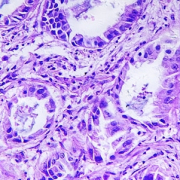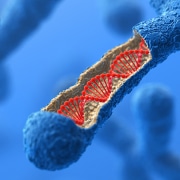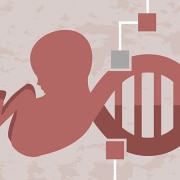Your attitude towards genomics: Which classic Christmas character are you?
We frame some perspectives on genomic testing through the lens of popular Christmas icons. A guest written long read by genetic counsellor Dr Jonathan Roberts
In the NHS, whole genome sequencing is being used more and more for diagnostic testing. This means patients must choose whether they want to receive any additional findings. For instance, someone may undergo genomic testing due to a family history of heart disease, but the test results may indicate an increased risk of cancer. Privately, direct-to-consumer genetic testing is also a popular option for individuals seeking more information about their ancestry, health and beyond.
Patients could be invited into a research settings. An example is the Generation Study, covered previously in this blog, which will look at the DNA of 100,000 newborn babies and test for more than 200 childhood-onset conditions to understand if we can improve how we diagnose and treat genetic conditions.
In each of these settings, people are asked to reflect on their feelings, values and beliefs in order to make decisions. To help you clarify your own views on genomic testing, here are five classic holiday characters.
Who are you most like?
The optimist: Buddy the Elf
Buddy the Elf is one of the most beloved Christmas characters. He is a natural optimist and very trusting. One of my favourite scenes, viewable via YouTube, is where he walks past a coffee shop that has the sign, “world’s best cup of coffee”. He rushes in exclaiming, “You did it! Congratulations!” Much of the humour in the film Elf comes from Buddy’s optimism which is, for the most part, pure naivety – but it becomes clear that Buddy’s personality has more to it than that. Buddy also chooses to trust people and to believe the best.
- From the blog: Polygenic scores show promise for improved prostate cancer detection
- From the blog: Achromatopsia gene therapy partially restores children’s colour vision
Many people approach genomic testing with a Buddy the Elf-like optimism. You might be someone who simply can’t see why you wouldn’t want to know more information about yourself from a simple test. I sometimes get a stunned reaction in clinic when I ask people if they want genomic testing. They look at me as if choosing not to find out had never crossed their minds! You might also be someone who believes that researchers are essentially good people doing good things and that advances in research will lead to new treatments, medicine and knowledge about ourselves. Genomic testing is taking us to the future; Buddy the Elf would want to be a part of that.
The watchful defender: Kevin McCallister (Home Alone)
Some people approach their health data with a similar attitude to Kevin McCallister defending his (really big, really nice) house from the ‘Wet Bandits’ in Home Alone. And much like the McCallisters’ residence, your DNA data is valuable. It is especially valuable if it can be linked to accurate information about your health and lifestyle.
A challenge is that genomic testing is increasingly being delivered in hybrid settings. Research studies are often done in partnership with clinical services, with results fed back to patients. On the other hand, the commercial direct-to-consumer genetic tests you can buy are often marketed as something fun – there to satisfy your curiosity. In both, the results can include serious pieces of health-related information. It can be hard to separate testing done for research, clinical and private purposes. In all these settings DNA data is valuable, and people will pay to have access to good data.
With all this hybridity, some people assume that if you have genomic testing, anyone could have access to your data. Naturally, some people are guarded, with stories about data breaches being common. Just weeks ago, the direct-to-consumer genetic testing company 23andMe suffered a significant data breach. These types of stories will make people think carefully about genomic testing. However, accessing genomic testing requires allowing at least some type of data sharing. If you are too much like Kevin McCallister, guarding your data at all costs, you may miss out on the advantages of genomic testing.
The information gatherer: Elf on the Shelf
I don’t do Elf on the Shelf, despite having two small children. If you’re not familiar, Elf on the Shelf is a character from a popular Christmas book of the same name. The idea is that they come to your home to watch over your family. The elf changes position each day and then flies back to the North Pole to report (some might say ‘snitch’) on you to Santa.
Elf on the Shelf is a classic information seeker. With genomics, there will be no shortage of opportunities to find out information. But the results are often more uncertain than we’d like to think, despite all the available data.
- From the blog: Whole genome sequencing: Seven uses in health and research
- Podcast: Genomics Conversation: Ethics and Data with Professor Anneke Lucassen
Our framework for thinking about genes comes from 19th-century Mendelian genetics. Gregor Mendel’s work established many familiar laws, namely dominant and recessive inheritance. The trouble with this idea is that it has – quite persistently – led us to believe human traits can have a singular genetic cause. There are very few human traits that have a single-gene (called ‘monogenic’) cause. Even for those that do, large population studies are showing that many people have a gene variant we think should cause a condition that, well, just don’t.
The uncertainty about genomic testing is worsened by the fact that most human traits, such as height, are complex. They are often caused by multiple genes interacting with environmental factors. New types of genomic tests (‘polygenic risk scores’) may be able to give some information about this. But many think that talking about polygenic risk scores will just muddy the waters. Increasingly for the information seekers, it can be a case of the ‘more you find out, the less you know’.
Take that, you snitching elf.
Cynic: the Ghost of Christmas Past
The Ghost of Christmas Past famously appears in Dickens’ classic A Christmas Carol. Dickens’ novel tackles the theme of injustice, which is prevalent in genetics’ (the older sibling of genomics) own past.
Some people approach genetics and research with a historically informed cynicism. Popular works like The Immortal Life of Henrietta Lacks have highlighted how people – often along the lines of race and class – can be exploited by science while others profit. In clinical settings, research continues to demonstrate how your race, class and gender can affect how you are treated.
Genetics has a dark past of its own. It has been used in eugenics, scientific racism and enforced sterilizations, to name just a few. These historical injustices continue to shape science today; genomic data sets are not very ethnically varied. This is a significant problem. If genomic data sets lack diversity, tests are less accurate for people not represented in those data sets. This issue is being tackled through ongoing studies, including Our Future Health and others.
In Dickens’ novel, the Ghost of Christmas Past helps Scrooge eventually changes his ways. We can hope that the Ghost of Christmas Future shows how genomics will truly benefit all.
Bottom-line thinker: John McClane (Die Hard)
I’m stretching it here and maybe just looking for another excuse to watch Die Hard. But often when talking about our own subject, we forget that people have so much else going on. Fine, you may not be pitting your wits in a fight to the death with Hanz Gruber in Nakatomi Plaza, but people’s lives are busy, stressful and difficult, so they may feel like they are! Many people lack the time or desire to learn about genomics. The John McClanes of this world would not have time for informed consent. I doubt he would have time to take part in research, and he would just want the bottom line from his test results.
- Video: Let’s Talk About… Communication Strategies
- From the blog: Patient perspectives: the art of good communication
This is a really important point for people offering genomic testing in health and research settings. The idea of informed consent grew out of concerns about ensuring that testing was never coercive. However, with the volume and complexity of genomic testing, the notion of informed consent can look dated. Can you imagine this in other contexts? “Look, before we do this MRI, we’re just going to go over the science of how it works…it’s important you know!” If we insist that people are informed on the ins and outs of the test – and we define what informed is – there is an argument we have slipped into paternalism.
I don’t quite know what the answer is here, but I do know that there are many John McClanes out there, people whose lives dictate that they act first and ask questions later. Genomic testing in both clinical and research settings needs to reflect this and develop practices that do not exclude people.
What’s your Christmas persona?
In reality, you’re not just one type of person when making a decision. You can vary wildly depending on various circumstances. When it comes to my own health, I’m a veritable Buddy the Elf. But with my children, I turn into a proper Elf on the Shelf (tell me everything!). The key, at least in my view, is that we are given space to listen to our emotions. Each character above is driven by a predominant feeling. If you can label and understand your emotions, you are much more likely to make decisions that are reasoned and align with your values.









